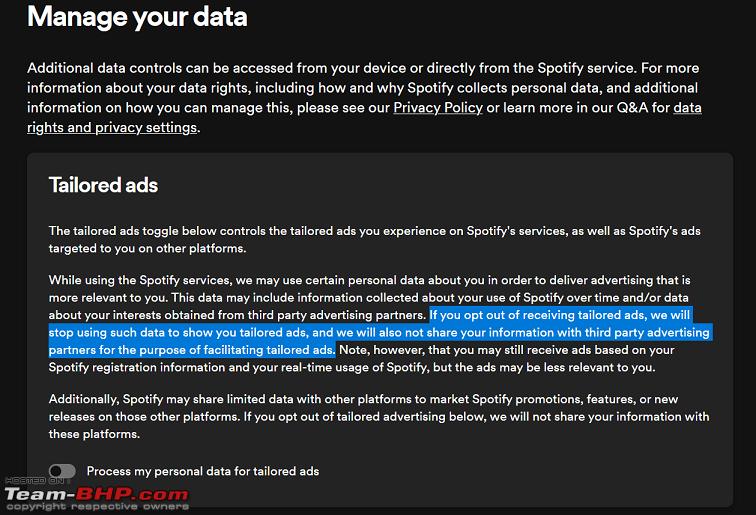| Re: Protecting your online privacy & user data
Quote:
Originally Posted by navin  On the face of it, once you sign into the internet you surrender your right to privacy. |
That is a very defeatist view. On one side there are worldwide efforts to make both privacy (derived from right to life) and Internet access (derived from freedom of speech) as inviolable human rights. Here you are, willing to give away one of them without recompense. Quote:
Originally Posted by navin  For example, if I use Spotify to listen to music, I implicitly agree that Spotify and, by extension, everyone on the internet will know what music I listen to. If I do not want to share that information, I can stick to listening to albums and CDs, and no one will be the wiser (especially since in my specific case, most of my albums and CDs were purchased before the internet existed). |
You don't. Since you took the Spotify example - they explicitly ask you to agree to this (and hopefully, as a reputable business, honour their users' choice). 
(Also I presume you are not aware that most software players have the functionality to contact 3rd-party services to download things like album art, lyrics, subtitles etc. that all necessarily involve telling these services what is playing currently.) Quote:
Originally Posted by navin  If Google has your data, expect it to be shared with the US Government (FBI, CIA, NSA, etc) and, by extension, with the Governments of the UK, Germany, France, and all Governments that agree to share data... |
This is probably a conspiracy theory. We know how this "sharing" has worked in Twitter thanks to Musk; which is basically not at all unless the appropriate paperwork was produced.
But I will give it to you that the resistance from Google/Apple will weaken over time, and by then we would have allowed these companies to know so much about us that we have to be very afraid starting now. Quote:
Originally Posted by navin  If you have nothing to hide, why worry so much? |
This is the biggest fallacy. The Wikipedia article summarises the quick refutations readily: https://en.wikipedia.org/wiki/Nothing_to_hide_argument
I would add these two:
1. "I have nothing to hide today" does not mean I won't have anything to hide tomorrow. I might learn something I've done in the past is actually wrong. Something benign today could become illegal in the future. And so on.
2. Everyone has something to hide. It might not be jail-worthy - could be something that might embarass them in their social groups, have monetary consequences, affect their relationships with their near and dear, negatively impact their careers and so on.
I defined privacy earlier as "our right to control who gets to observe and process our interactions and opinions". Each individual must be able to draw that control line where they wish. If your line is far to the right ("I don't need to control this"), that is totally fine - but you need to be aware that there would be others who'd draw that line further and further to the left of yours. | 

 (1)
Thanks
(1)
Thanks

 (1)
Thanks
(1)
Thanks
 (3)
Thanks
(3)
Thanks
 (1)
Thanks
(1)
Thanks





